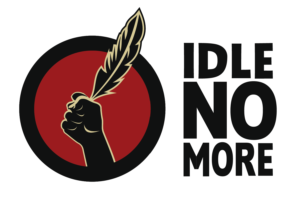Turning the Tables: Self-Determination NOT Termination – Idle No More
Please join us to Turn the Tables on Termination in our Idle No More Webinar:
The Idle No More webinar on the Termination Tables will be presented by policy analyst Russell Diabo and moderated by Dr. Shiri Pasternak. Monday August 18th 7:00 p.m. E.S.T.
It will answer important questions such as: What are the Termination Tables? Who is negotiating at the Termination Tables? How will this affect future generations of Indigenous people? What can communities do to organize and stop these negotiations?
Join the Webinar!
Click here for more info and to register on the Idle No More website.
Click here for more info and to register through Facebook.
Summary Information:
What is Termination?
Termination means the ending of First Nations pre-existing sovereign status through imposed Indian Act legislation, policy and federal coercion of First Nations into Comprehensive Land Claims and Self Government Final Agreements that convert First Nations into municipalities, their reserves into fee simple lands and extinguishment of their Inherent, Aboriginal and Treaty Rights!
What are the Termination Tables?
The termination tables are negotiation tables between the Federal Government and mainly First Nations Chief and Councils. These negotiations are called “Comprehensive Land Claims” and/or “Self-Government” negotiations, the final agreements will–within Canadian constitutional law–extinguish Aboriginal Title and convert “Indian Bands” into municipal type governments where federal and provincial powers will dominate First Nations powers.
Who is negotiating at the termination Tables?
There are currently 403 communities at these 93 negotiation tables. The interactive map shows the location of Aboriginal communities negotiating agreements, including specific information on all negotiations in progress.Here is the link:
http://www.aadnc-aandc.gc.ca/Map/ngtble/ngtble-eng.asp)
What can First Nations do to turn the tables on termination?
1. Find out if your Chief and Council is negotiating at a Termination Table.
2. Educate community members about how the Termination Tables will have intergenerational effects for the loss Indigenous rights. Our children and grandchildren will lose their inherent rights to self-government and access to land.
3. Plan community meetings to seek support on stopping these negotiations that are based on extinguishment and denial of our Inherent, Aboriginal and Treaty rights and campaigning to replace these Terminations Tables with Self-Determination Tables that are based on recognition and affirmation of our inherent, Aboriginal and Treaty rights..
“The hope is in the people” Interview with Russell Diabo
For Further reading:
SCC Tsilhqot’in Decision: Canada’s First Nations Termination Policies by Russell Diabo (July 14, 2014
https://intercontinentalcry.org/scc-tsilhqotin-decision-canadas-first-nations-termination-policies/
Canada: Prime Minister Harper Launches First Nations Termination Plan by Russell Diabo (Jan 10 2013)
Harper Launches Major First Nations Termination Plan: As negotiating tables legitimize Canada’s colonialism. by Russell Diabo (Nov 2012)
Indigenous Foundations: What are Aboriginal Rights? (UBCIC)
http://indigenousfoundations.arts.ubc.ca/home/land-rights/aboriginal-rights.html
Aboriginal Policy: Legal and Constitutional Framework: Federal Department of Justice;1990
http://www.turtleisland.org/news/abpolicy.pdf
Canada’s Struggle to Extinguish Aboriginal Title (UBCIC)
http://www.ubcic.bc.ca/Resources/certainty.htm#axzz3ABiQbbTc
The Federal Government’s Termination Policy mirrors the United States Indian Termination Policy http://en.m.wikipedia.org/wiki/Indian_termination_policy
